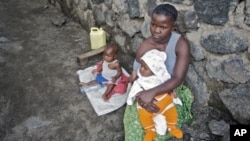An investigation into mass rapes in the Democratic Republic of Congo has been called off after some of the victims were attacked.
The United Nations said Wednesday that a judicial inquiry had spoken to about 150 victims and witnesses but that some of those who spoke had suffered from reprisals.
At least 387 women, men, and children were raped in several villages in eastern Congo's North Kivu province in late July and early August of last year.
Well planned
A U.N. report released Wednesday says the well-planned nature of the attacks mean they could be considered crimes against humanity and war crimes.
The U.N. accuses former Congolese government troops, Congolese Mai-Mai militia and Rwandan Hutu rebels of carrying out the attacks. So far, only one person has been charged with any crimes.
The U.N. peacekeeping force in Congo has been criticized for not preventing the rapes in July and August.
Rape capital
United Nations officials have previously called Congo "the rape capital of the world." They say an atmosphere of impunity allows soldiers, rebel fighters, and civilians to rape women and children without fear of arrest.
Last week, a U.N. spokesman in Geneva said investigators had confirmed at least 121 cases of rape during a three-day rampage by troops in Nakiele, in South Kivu province, this past June
Some DRC officials and human rights groups have blamed the incident on a Congolese colonel, who led about 100 troops on a series of attacks in the area after deserting the army.
Criticism
The United States Wednesday said it is "gravely disturbed" by the incident and condemned the attack.
State Department spokeswoman Victoria Nuland said the U.S. is working to provide support to the survivors and to help track down, arrest and prosecute those responsible.
There are currently 20,000 U.N. peacekeepers in Congo.
In May, Congo asked the United Nations to withdraw its peacekeepers and allow the country to take over its own security, saying the country has made significant progress in reducing threats to the safety of citizens.
Some information for this report was provided by AP and AFP.




